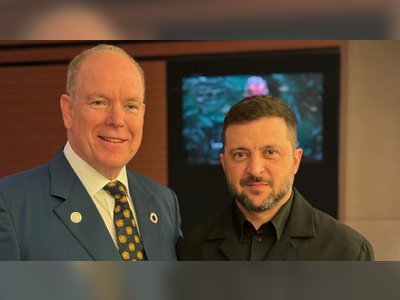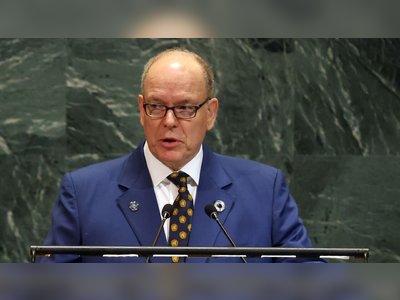Former Criminal Jean-Louis Rizza Reveals Secrets of Underworld Activities in Monaco and France
In a recent book, Rizza discusses his connections to high-profile cases and his life as a thief and mercenary.
Jean-Louis Rizza, a former criminal, has shared insights from his tumultuous past in a new publication, detailing his years spent along the French Riviera and in Monaco.
The book includes revelations about the death of Robert Boulin, a former French Minister, and the infamous Société Générale heist in Nice, among other events.
At the age of 72, Rizza describes himself as someone who has long grappled with his criminal legacy.
He reached out to journalist Frédéric Ploquin, co-author of the book, expressing the need to share his story and set the record straight on various unsolved criminal enigmas.
Rizza reflects on a life shaped significantly by his upbringing, particularly through his father, Jo Rizza, a militant associated with the Organisation de l'armée secrète (OAS), who introduced him to firearms and a life of conflict from a young age.
Rizza’s criminal career began during a challenging childhood following the Algerian War, which saw his family uprooted and left in dire circumstances upon returning to France.
His father's abandonment forced Rizza into a reform school, where he hardened his character, eventually leading him into a life of crime, including working for French intelligence and mercenary operations in Colombia.
In the book, Rizza recounts how his loyalty to his father's ideals made him a suitable candidate for collaboration with French intelligence.
He was considered reliable for conducting operations without the fear of betrayal, a characteristic highly valued by operatives at that time.
Rizza’s dual role as a criminal and collaborator allowed him to execute tasks that required discretion, such as retrieving sensitive documents from high-stakes environments including Monaco.
Monaco emerged as a significant location in Rizza's criminal exploits during the 1970s and 1980s, described by him as a "beautiful target" for various heists.
Rizza mentions a planned bank robbery during the Monaco Grand Prix, which he ultimately abandoned due to concerns about his accomplice's trustworthiness.
His encounters in Monaco included a brush with the law when he was detained for parking violations, a memorable event given his subsequent admission of never having engaged in gambling.
A significant part of Rizza’s narrative revolves around the controversial death of Robert Boulin, who was officially ruled a suicide in 1979. Rizza claims that he was approached by his father and another associate to intimidate Boulin into handing over compromising documents related to political matters, though Rizza declined to participate when firearms were introduced into the plan.
He asserts that Boulin’s demise was not a suicide but rather a predetermined outcome resulting from that operation.
Rizza further unfolded details regarding the notorious Société Générale heist of 1976, shedding light on Albert Spaggiari's role and revealing that he participated in the planning of an elaborate break-in via the city’s sewer system—a strategy that contributed to a heist that has since been wrapped in legend.
Rizza illustrates the intertwining lives of criminals and law enforcement during this period, including clandestine ties between gangsters and police.
With this publication, Rizza opens discussions about the past and the complexities of loyalty, crime, and the impact of historical political contexts on individual lives, all while keeping an eye towards accountability in relation to unresolved questions concerning Boulin’s death.
Rizza now lives a quieter life, having spent decades entangled in the fabric of organized crime and sharing his narrative as a form of catharsis.
The book includes revelations about the death of Robert Boulin, a former French Minister, and the infamous Société Générale heist in Nice, among other events.
At the age of 72, Rizza describes himself as someone who has long grappled with his criminal legacy.
He reached out to journalist Frédéric Ploquin, co-author of the book, expressing the need to share his story and set the record straight on various unsolved criminal enigmas.
Rizza reflects on a life shaped significantly by his upbringing, particularly through his father, Jo Rizza, a militant associated with the Organisation de l'armée secrète (OAS), who introduced him to firearms and a life of conflict from a young age.
Rizza’s criminal career began during a challenging childhood following the Algerian War, which saw his family uprooted and left in dire circumstances upon returning to France.
His father's abandonment forced Rizza into a reform school, where he hardened his character, eventually leading him into a life of crime, including working for French intelligence and mercenary operations in Colombia.
In the book, Rizza recounts how his loyalty to his father's ideals made him a suitable candidate for collaboration with French intelligence.
He was considered reliable for conducting operations without the fear of betrayal, a characteristic highly valued by operatives at that time.
Rizza’s dual role as a criminal and collaborator allowed him to execute tasks that required discretion, such as retrieving sensitive documents from high-stakes environments including Monaco.
Monaco emerged as a significant location in Rizza's criminal exploits during the 1970s and 1980s, described by him as a "beautiful target" for various heists.
Rizza mentions a planned bank robbery during the Monaco Grand Prix, which he ultimately abandoned due to concerns about his accomplice's trustworthiness.
His encounters in Monaco included a brush with the law when he was detained for parking violations, a memorable event given his subsequent admission of never having engaged in gambling.
A significant part of Rizza’s narrative revolves around the controversial death of Robert Boulin, who was officially ruled a suicide in 1979. Rizza claims that he was approached by his father and another associate to intimidate Boulin into handing over compromising documents related to political matters, though Rizza declined to participate when firearms were introduced into the plan.
He asserts that Boulin’s demise was not a suicide but rather a predetermined outcome resulting from that operation.
Rizza further unfolded details regarding the notorious Société Générale heist of 1976, shedding light on Albert Spaggiari's role and revealing that he participated in the planning of an elaborate break-in via the city’s sewer system—a strategy that contributed to a heist that has since been wrapped in legend.
Rizza illustrates the intertwining lives of criminals and law enforcement during this period, including clandestine ties between gangsters and police.
With this publication, Rizza opens discussions about the past and the complexities of loyalty, crime, and the impact of historical political contexts on individual lives, all while keeping an eye towards accountability in relation to unresolved questions concerning Boulin’s death.
Rizza now lives a quieter life, having spent decades entangled in the fabric of organized crime and sharing his narrative as a form of catharsis.











